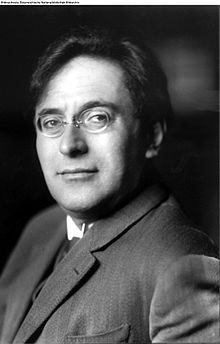Julius Isserlis
Julius Isserlis (Oct. born 26 . Jul / 7. November 1888 greg. In Kishinev , Russian Empire ; died 23. July 1968 in London ) was a Russian pianist and composer.
Life
Isserlis' mother was a midwife and the father a traveling dentist . Isserlis attended the Kiev Conservatory from the age of nine and two years later went to Vasily Safonov at the Moscow Conservatory , where Sergei Taneyev became his composition teacher. At sixteen he won a gold medal on the exam. He went to Paris for further training with Charles-Marie Widor and, through Alexander Scriabin's mediation, had a concert appearance with the Russian Philharmonic Orchestra in New York . In 1911 he was appointed professor at the Academy of the Imperial Philharmonic Society in Moscow, he was the only Jew in the college. In 1916 he married Rita Rauchwerger, who came from a middle-class family in Odessa .
After the Russian Revolution in 1917 , Isserlis stayed abroad with Russian musicians on the occasion of a concert and propaganda trip in 1923 and moved to Vienna . In Austria he made his living as a freelance pianist and composer. When Isserlis made a concert tour to England in early 1938, Austria was " annexed " to the German Empire, so that Isserlis had to stay in England. His wife Rita and his only son George (1917–2012) managed to leave in time four months later, under the conditions of the persecution of the Jews.
He also worked as a freelance musician and concert pianist in Great Britain. He last lived in West Kensington .
Julius Isserlis' son George had to drop out of his violin training for health reasons and became an engineer in metallurgy. The violinists Annette Isserlis, Rachel Isserlis and the cellist Steven Isserlis are children of George.
Since 1980 the Royal Philharmonic Society has awarded an "RPS Julius Isserlis Scholarship" to the next generation of musicians.
Trivia
When he was looking for a flat in Vienna in 1923, Isserlis told his grandchildren that an ancient landlady had turned him down as a pianist because she remembered her aunt who had rented the room to a crazy, deaf musician who also always spat on the floor: Beethoven .
Compositions
In alphabetical order.
- A peasant wedding No. 6 from memories of the youth, op.11
- Ballad in A minor
- Ballad in E flat minor, Op. 3 No. 2
- Ballad in G minor, Op. 3 No. 1
- Capriccio in A minor, op.12
- Three piano pieces, op.8.Universal Edition, 1930
- In the Steppes No. 2 from Jugenderinnerungen, op.11
- Memories of the Youth, op.11
- Marionettes No. 5 from memories of the youth, op.11
- Meditation No. 2 from Three Pieces for Piano, op.8
- Moment musical No. 1 from Three Piano Pieces, op.8
- Moment dreary
- Once in autumn No. 4 from memories of the youth, op.11
- Prelude exotic, op.10 No. 2
- Russian Dance, op.7.Universal Edition, 1930
- Skazka “Fairy Tales”, op. 6. Universal Edition, 1934
- Souvenir russian; op.9.Universal Edition, 1931
- The bumblebee No. 3 from memories of the youth, op.11
- The flight of the swallow No. 3 from Three Piano Pieces, op.8
- The lonely brook in the forest No. 1 from Jugenderinnerungen, op.11
- Toccata in fourths, op.10 No. 1
- Why?
- Ten Preludes, op.2
literature
- Salomon Wininger : Great Jewish National Biography . Kraus Reprint, Nendeln 1979, ISBN 3-262-01204-1 (reprint of the Czernowitz edition 1925), Volume 7, p. 576
Web links
- Literature by and about Julius Isserlis in the bibliographic database WorldCat
- Julius Isserlis plays Scriabin 24Preludes +2 (Sakuraphon CD reissued) This CD include Isserlis's important 78rpm recordings (Chopin & Liszt works).
Individual evidence
- ↑ a b c d e Rachel Isserlis: Julius Isserlis , accompanying text at hyperion records. German: Judith Jamin
- ↑ Salomon Wininger: Great Jewish National Biography . 1925, Vol. 7, p. 576
- ↑ Rita Rauchwerger may be a relative of the Odessa musician Michail Rafailowitsch Rauchwerger
- ↑ George Isserlis, Obituary , The Telegraph , July 4, 2012
| personal data | |
|---|---|
| SURNAME | Isserlis, Julius |
| BRIEF DESCRIPTION | Russian pianist and composer |
| DATE OF BIRTH | November 7, 1888 |
| PLACE OF BIRTH | Kishinev , Russian Empire |
| DATE OF DEATH | July 23, 1968 |
| Place of death | London |

